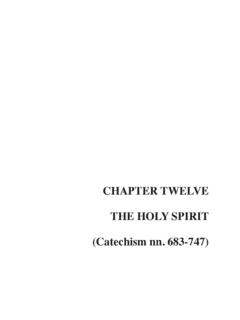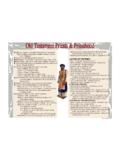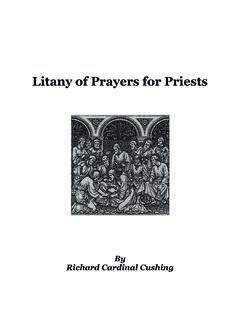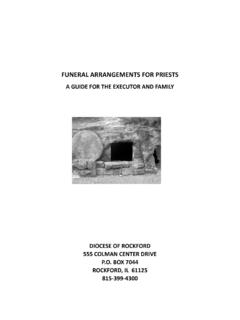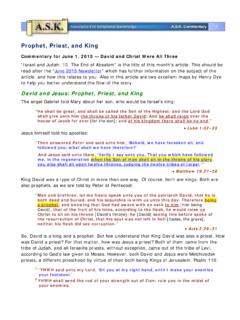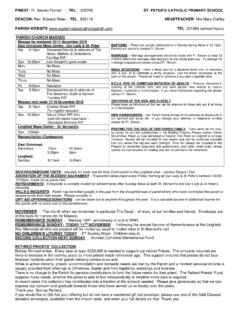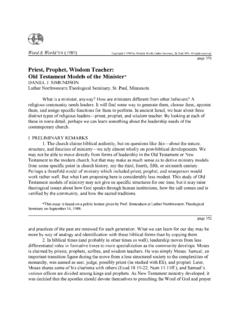Transcription of PRIEST, PROPHET, KING - mbfallon.com
1 17 Priest- prophet -kingPRIEST, prophet , KING18 Priest- prophet -kingThe ordained minister as a sacrament of Christ the Shepherd- king , prophet and PriestSome members of the Body of Christ are chosen to receive the Sacrament of Orders. As baptized Christians they continue to share in the priestly-prophetic-kingly life and ministry of Jesus as outlined in the previous meditation. Just as the sacrament of marriage bestows on certain baptized men and women a special grace related to their state in life, so the sacrament of orders bestows on certain baptized members of the church a special grace and a special sharing in the Christ s priestly-prophetic-kingly life and ordained ministers belong to a sacramental brotherhood (PO, n. 8) of the ordained presbyterate, and they are consecrated and minister as members of that brother-hood.
2 This male language is changing in those churches that ordain women. However, the Catholic Church in communion with Rome is among those churches that continue the custom of restricting ordination to Second Vatican Council speaks of those who exercise the sacrament of orders: Christ, whom the Father hallowed and sent into the world has, through his apos-tles, made their successors the bishops sharers in his consecration and mission; and these in their turn duly entrusted in varying degrees members of the church with the office of ministry. Thus the divinely instituted office of ministry is exercised in different degrees by those who have from ancient times been called bishops, presbyters and deacons (LG, n. 28).This statement intentionally leaves open the complex historical question of the origin of the three ministries of bishop, presbyter and deacon, and is content to remind us of their ancient standing.
3 In declaring that the office of ministry is of divine institution, no equivalent claim is being made of the ways in which this ministry has found historical the many gifts poured out on the community by Christ, Paul speaks of those that are central to the founding and maintaining of the Church as the Body of Christ: The gifts that he gave were that some would be apostles, some prophets, some evangelists, some pastors and teachers, to equip the saints for the work of minis-try, for building up the body of Christ (Ephesians 4:11-12).The apostles are those who have seen the Lord (Acts 1:22; 1 Corinthians 9:1) and who have received a personal commission from him (Galatians 1:1,12). As such, the ministry of apostle is unrepeatable. The prophets are those who receive revelation from the Spirit concerning the mysteries of God and are commissioned to communicate this revelation to the community.
4 Their gift lies outside the organisational structure of the community, for the Spirit breathes where he wills, and you hear the sound of it, but you do not know where it comes from or where it goes (John 3:8). The ministries of apostle and prophet are foundational to the Church (Ephesians 5:20). Paul speaks also of evangelists . Hav-ing learned the Gospel from the apostles, these in their turn go out as missionaries and preach the word to others. Pastors and teachers remain in the community once formed to guide, instruct, nurture, protect, conserve and build it up. Those exercising organisa-tional leadership have the responsibility of unifying and coordinating the various gifts, 19 Priest- prophet -kingministries, and powers of the members of the community for the better functioning of the body. As church order developed, the task of organisational leadership fell to the bishops, assisted by presbyters and deacons.
5 The bishops are successors of the apostles, not individually, but by being constituted members of the episcopal body (CD, ). This body carries on certain aspects of the apostolic ministry. Presbyters, to a lesser degree, share in this. The explanatory note from the Commission, appended to Lumen Gentium and published along with it in the official Latin text, states that this does not imply the transmission of the extraordinary power of the apostles to their successors . We must conclude that what is said of the apostles can be applied to bishops and presbyters only with necessary ordained minister as a sacrament of Christ the evidence of the New Testament and historical studies of the first and second centu-ries of the Christian era indicate that Christian communities were, from the beginning, structured and organised in a variety of ways.
6 However, influenced by the organisation of the Roman state and by the needs of the times, some time in the second century the system of mono-episcopacy emerged as the universal pattern of government. According to this system, the local Christian community was under the leadership of one bishop who was assisted by a number of presbyters and deacons. This system still prevails in the Catholic Church in communion with Rome, in the various Orthodox churches, and in a number of other Christian churches. The members of the Christian community who receive the sacrament of Orders are conse-crated by a special grace to be in the Church a sacrament of Christ precisely as Head of the Body. When Paul speaks of the Christian community as the body of Christ (eg Colossians 1:18; Ephesians 1:23; 5:23), he is focusing on the profound truth that the life of the com-munity is an expression of Jesus own Spirit.
7 Christ is the head of the body because he is its inspirer. He wills to draw everyone to himself (John 12:32) in order that we may live and live to the full (John 10:10), by sharing in the communion of love which he has in God. He also shares with his disciples his mission and the power to carry it out, for God wants everyone to be saved and to come to the knowledge of the truth (1 Timothy 2:4). The ordained ministers are a sacrament of Christ-as-Head, incarnating in their ministry the grace with which Christ the head of the body inspires and directs it. An ordained minister, while sharing membership in the Body of Christ with his brothers and sisters, is consecrated in a special relationship to Christ: he is a sacrament of Christ who, as head, mediates between God and the ministry of the ordained is a ministry of leadership.
8 From the outset it is important to underline the obvious truth that one can be a leader in any number of ways, includ-ing teaching, healing, and serving. The most important leadership within the Christian community is given by those men and women who are recognised as models of holiness, and the most important quality here is that of love. It can, therefore, be rightly claimed that the most important leadership in the Church is leadership in love, and anyone can 20 Priest- prophet -kingexercise this leadership. In referring to the presbyter as a leader we are speaking only of organisational leadership leadership in the ordering of the community. Of course, with this ministry as with all the other ministries, the one entrusted with it carries it out best when he does so in love. We refer back to the earlier meditation in which we out-lined the characteristics of Jesus exercise of the role of Shepherd- king in his life and ministry, culminating in his self-giving on the cross.
9 The ordained minister is to carry out his ministry of leadership of the community with the mind and heart of Jesus, as a service to Christ s Body the ordained minister is to help make the faithful aware of their role, as baptized Chris-tians, to be sacraments of Christ the king , allowing the Spirit of the risen Christ to inspire them to contribute to bringing about the reign of God in the in the life and ministry of Christ the ProphetProphecy cannot be institutionalized, There is nothing especially prophetic in the life and ministry of the ordained. God can use any instrument to reveal his surprising word. The ordained do have a special role in preaching and teaching, but these are expressions of his priesthood, not of any particular prophetic charism. Let us now turn to reflect on the ordained minister as a sacrament of Christ the ordained minister as a sacrament of Christ the PriestThe organisational position of the presbyter derived from Jewish synagogue practice in which the local community was under the leadership of a group of older men, the presbyters.
10 Though the English priest derives from the word presbyter , the Jewish presbyter (Hebrew: z k n; Greek: presbyteros; Latin presbyter) was not a priest (He-brew: koh n; Greek: hiereus; Latin: sacerdos). By the third century, however, Christian presbyters, as well as the overseers of the community, the bishops , were being referred to as priests .In its Decree on the Ministry and Life of Presbyters (Presbyterorum Ordinis, 7th De-cember 1965) the Second Vatican Council generally uses the word presbyter to speak of those exercising the ordained ministry. However, in the following texts, it uses the word priest (Latin sacerdos ). In the opening paragraph the Decree speaks of presbyters being in the service of Christ the Teacher, Priest and king . It goes on to speak of the priestly office exercised by the presbyters ( ). It speaks of priestly preaching , and states that the faithful seek for God s word from the mouth of priests ( ).
